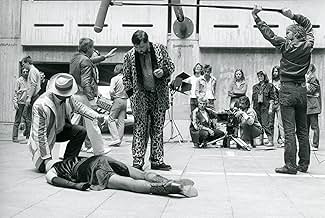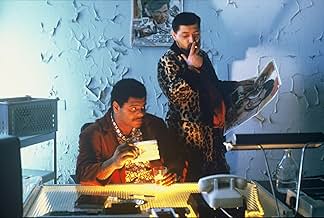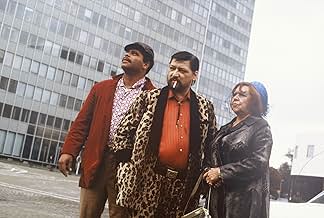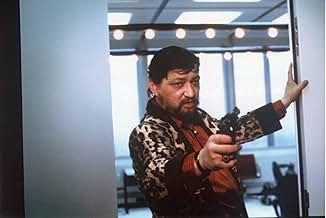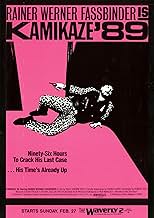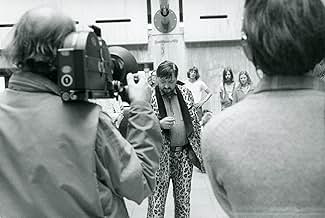Aggiungi una trama nella tua linguaIn a totalitarian society of the future, in which the government controls all facets of the press, a homicide detective investigates a string of bombings, and finds out more than he bargaine... Leggi tuttoIn a totalitarian society of the future, in which the government controls all facets of the press, a homicide detective investigates a string of bombings, and finds out more than he bargained for.In a totalitarian society of the future, in which the government controls all facets of the press, a homicide detective investigates a string of bombings, and finds out more than he bargained for.
- Regia
- Sceneggiatura
- Star
- Premi
- 1 vittoria e 3 candidature totali
- Wechselschichtregisseur
- (as Andreas Mannkopf)
- Polizeiärztin
- (as Ute Fitz-Koska)
- Polizist
- (as Hans-Eckhardt Eckhardt)
Recensioni in evidenza
Disguised as a predator, Lt.Jansen is an amoral and voyeuristic, yet totally flaccid being. Tired and sluggish this detective only incriminates himself - but the Inquisitor he faces - is us.
I liked this odd movie - it is neither all low nor all high-brow art. It will probably put many to sleep - the violence is gratuitous and minimal, the main character is a walking dead man (interesting fact is that Fassbinder after dying in real life was BURIED in the costume of Lt.Jansen) - it has a charm that remains intact despite its pedigree as art-house junk.
Adapted from the novel "Mord på 31: a våningen" by Per Wahlöö, co-written and directed by Wolf Gremm, dystopian movie which alcohol and leafy vegetables was forbidden and that CEO's have has a grasp over the general public through television. It stars known director Rainer Werner Fassbinder as Lieutenant Janson investigating a fake bomb threat of a building where TV CEOs' base is derived from. Because the threat was taken seriously, Lieutenant Janson was left figuring out the culprit that started the clearance of the building before given only four days to solve it. At the same time, he is also in a middle of a radical group for the intention of shutting the entire tv organization altogether, who call themselves "Krysmopompas" who often clash with the comp. Green Panther. And then from the very same building. Someone jumped off the building from the 31 st floor with the lieutenant refused access in in comparison to the other rooms and floors.
Being a big Fassbinder fan, I rented this with excitement. Fassbinder stars, and he's always fun to watch. It's one of those punk-future-dystopian movies that popped out a bit in the early '80s, always good for some cult fun. It came out at the end of Fassbinder's career, and Fassbinder's whole 12 year filmmaking period only got better and better until his end.
So half way through I thought "what the hell happened? This movie is an atrocity exhibition."
Then I glanced at the cover, and in horror noticed this movie was NOT directed by Fassbinder. He just starred in it in a coked up narcisstic haze. I read he actually wore that leopard outfit he was giving in this movie on and off again in the last few weeks of his life.
Fassbinder was proud of this movie, somehow, and that gives it an odd charm. It's horrendous, but I haven't regretted watching it. There's a scene where Fassbinder climbs to a roof of a building, odd buzzing music is playing and the wind is blowing his hair and he has this perverse smile on his face as he gazes out across the city. There's also the ending where Fassbinder, bloated, in a robe, girates his body against a photo of an astronaut (I'm guessing this is Fassbinder's input, as the exact same ending pretty much is used in Stationmaster's Wife). These two scenes made it worthwhile. Otherwise, mark it off as an awful "Alphaville" rippoff.
The story takes place in 1989, 1989 as anticipated in 1982, in a future and totalitarian Germany. Fassbinder plays in this film the role of police lieutenant Janssen, called to investigate a suspected bombing, followed by a crime in the corporate headquarters that controls the morale of the population through television entertainment. His mission to solve the crime in the next four days is hampered by the fact that in the utopian society described in the film, officially, there are neither crimes nor suicides. The world of 'Kamikaze 89' is a rosy dystopia, in which the population is kept under control by Big Brother surveillance while the brains are washed and occupied by television shows such as the 'World Laughter Record'. The cynical, alcoholic and disillusioned Janssen may be the right man to solve this case, but as the circle of suspects gets closer to the company's bosses and that mysterious, secret '31st floor' in which the scenarios of future are written, the solving of the crime becomes a danger for the stability of the system.
The comparison between the future imagined in the literature and the films of anticipation and the reality of the anticipated period is, as always, fascinating. Although the interval is only seven years, the essential changes are those that take place in the social structure. Director Wolf Gremm did not have a budget that would allow him to create spectacular special effects, so he relied more on cultural extrapolations, some subtle, some less subtle. The Internet does not exist yet, and computers are as large as refrigerators and do not have graphical interfaces. Telephony and mobile videophones are controlled by the authorities. The population is fascinated by popular entertainment, and on this topic Gremm was able to correctly anticipate the devastating effect of 'reality show' genre, even if the phenomenon he described will occur one or two decades later than 1989. Electronic music and psychedelic clothing have become an aesthetic norm, and if we look at some societies in Asia today, we see that cultural conformism is not necessarily gray and militarized there. Leopard coats or jackets are police uniforms. The control of populations is facilitated by their addiction to escapist entertainment. The framing of the film in the patterns of the genre of punk anticipation is formally correct, but the stylistic decisions are motivated by a clear and not at all optimistic vision about the future.
Fassbinder's acting reminded me Orson Welles in the second part of his career. The director who gave the world in his youth the masterpiece 'Citizen Kane' constantly projected for grand plans, but after a few financial failures Hollywood no longer believed in him as a director. The result was that he appeared more as an actor, some of his roles were memorable as he succeeded to be both expressive and 'to melt' in his characters, modeling them according to his personality.
'Kamikaze 89' anticipates from many points of view the world 30 years later, with the domination of the big global corporations and the popular entertainment and communications as means of leveling the thinking of the population. 1989 however brought something else, the fall of the Iron Curtain followed by the reunification of Germany, historical events that Fassbinder prepared and anticipated artistically and ideologically in other films. Those were the milestones in the evolution towards the world of 'Kamikaze 89'.
Police lieutenant Jansen, unforgettably played by Rainer Werner Fassbinder in his last role, is charged with the investigation, during which the open position of Krysmopompas is offered to him several times, but he refuses to take it over. Since the concern represents the good, the police must represent the evil. Even the police president is in the hand of the concern and looks like a caricature of Dr. Mabuse turned himself into a puppet. Possibly Jansen realizes that becoming Krysmopompas and thus fulfilling the vacuum of evilness would just consolidate the omnipotent concern, because it needs the evil to define itself as the good. Consequently, the director of the concern offers him a job, which Jansen also refuses. Therefore, Jansen takes a third position in a world in which there are only two, and this is presumably the reason why the movie is called "Kamikaze". However the title may be meant, this movie offers a highly complicated situation in which the categories of ethics are perverted. The typical 80ies' German TV-style of this movie should not make the audience blind that in portraying paradoxical ethical categories in a world in which metaphysics has been shoveled out like the alcohol, the seeds and suicide, "Kamikaze" goes way beyond thematically related movies like Godard's "Alphaville", Kubrik's "Dr. Strangelove" and even Tarkovsky's "Solyaris". A few years before "Kamikaze 1989", Fassbinder himself had directed the science-fiction movie "Welt am Draht" ("World on wire") which many people believe to have surpassed "Solyaris". In the final scene of Kamikaze, Fassbinder says his ultimate goodbye to his audience grinning in front of a picture of Armstrong's moon landing.
Lo sapevi?
- QuizThis was the final acting role for Rainer Werner Fassbinder.
- BlooperThe movie claims 27 September 1989 to be a Monday, but that day was a Wednesday (The movie plays in 1989, as the title and a spoken intro make clear. The supposed explosion in the beginning of the movie was planned to take place on September 23, as Jansen points out. The chief of the police then urges Jansen to solve the case within for days, saying "until Monday afternoon," which would be September 27).
- Citazioni
Policewoman: Suicide
Polizeileutnant Jansen: It would be the first in four years.
Policewoman: Sorry, I meant 'premature death.
- ConnessioniFeatured in Fassbinder (2015)
I più visti
- How long is Kamikaze 89?Powered by Alexa
Dettagli
Botteghino
- Lordo Stati Uniti e Canada
- 22.440 USD
- Fine settimana di apertura Stati Uniti e Canada
- 5613 USD
- 5 giu 2016
- Lordo in tutto il mondo
- 22.440 USD
Contribuisci a questa pagina



